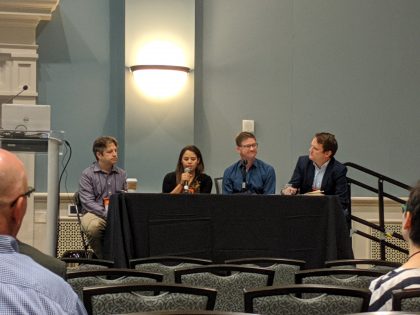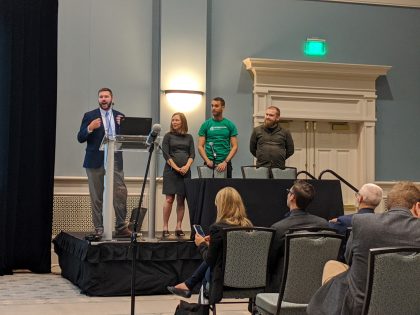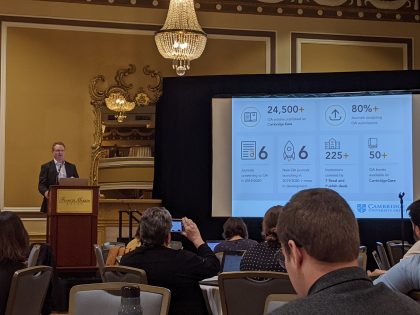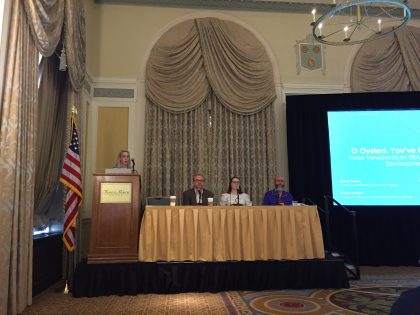Cambridge at the 39th Charleston Library Conference, November 4-8, 2019: 4 sessions, 2 awards
The Charleston Library Conference is a collegial gathering of librarians, publishers, and vendors of library materials who discuss issues of importance to them all in a friendly and informal environment. Corporate heads discuss and debate with library directors, acquisitions librarians, reference librarians, serials librarians, collection development librarians, and others. Begun in 1980, the Charleston Conference has grown from 20 participants to thousands in 2019.
Cambridge personnel spoke at 4 Charleston Library Conference sessions this year, including:

Developing open access partnerships and transformative agreements (Andrew Sykes, Marketing Director, Strategic Projects, and Jennifer Maurer, Library Sales Manager), in which the Cambridge-University of California (UC) recently-negotiated Read & Publish arrangement was discussed from both Cambridge’s and UC’s perspectives. The panel talked about how and why this arrangement benefits both organizations; the anticipated – and unanticipated – difficulties in implementing the agreement; and lessons learned along the way.
Charleston Premiers (Brigitte Shull, Senior Vice President, USA), in which Cambridge Open Engage was presented. Open Engage began as a preprint server for the American Political Science Association, but has evolved into an early publishing solution which can serve as a benefit for ‘read’ institutions and also provide support for Green archiving.
Trimming the sails: What you need to know about Transformative Agreements (Chris Bennett, Global Sales Director), where the perspectives of a library (Iowa State) and a consortium (Max-Planck Digital Library) added to Cambridge’s view as a publisher toward Read & Publish deals. All agreed that there can be unintended consequences – rising costs, decline in quality, stakeholder inequity – and in the future hope to move away from an APC-based model, but as a means of transitioning towards Open Access, right now these arrangements are vitally important.
O Oysters, You’ve Had a Pleasant Run: Three Viewpoints on EBAs in Long-Term Collection Development Strategies (Sara Forsyth, Senior Library Sales Executive). Sara moderated a fascinating discussion in which librarians from McGill, University of Calgary, and University of British Columbia explained whether or not they use Evidence-Based Acquisition (EBA) arrangements in their ebook acquisition efforts, and the reasons for their choices.
Cambridge also was the recipient of two awards announced at the conference:
The Charleston Advisor selected Cambridge University Press as offering “Best Contract Options” in its Eighteenth Annual Reader’s Choice Awards. The awards are given for the best digital products or services of interest to libraries and academia. The winners are selected by the CA’s editorial board, which includes senior library staff at US universities and members of the publishing industry.
Cambridge Open Engage won the “Best Design” award at the Charleston Premiers session. 12 new products from 10 companies were presented in 5 minutes apiece, and then the session’s audience voted on the winner.






